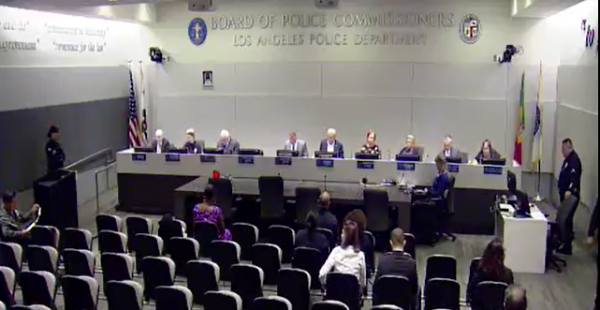I worry about writing on topics that are too stupid for words. I’m afraid the ink from my pen or characters from my keyboard will refuse to flow onto the paper or screen, and I won’t be able to communicate to you just how dumb some of this nonsense is for cops these days. Here’s what I mean.
I recently wrote about a police officer who may receive civilian review recommended discipline from his police chief after he tackled an ax-wielding suspect, bringing the incident to a safe conclusion with no one injured—not even the suspect. His police union named him Officer of the Month for his actions. Whether the chief imposes the recommended discipline isn’t even the point any longer. Now, the point is that discipline against a heroic officer was recommended at all.
I remember reading about a woman who raised stupid to a whole new level when she criticized a police shooting of an armed suspect. She said the police shouldn’t have shot the man because—get ready…The suspect hadn’t actually pointed the gun at the officer—yet. Does she know how quickly a person can bring a firearm up and on target? Just point and shoot? No, I’m sure she doesn’t. And, it’s getting even worse for officers.
Now, cops face a new low in civilian investigation standards. Even when a suspect is actively shooting at officers, apparently, they risk discipline if they shoot back.
Sandy Malone, writing for Blue Lives Matter, is reporting that in Los Angeles, a civilian oversight panel, investigating the officer-involved-shooting of a suspect who was shooting at police in an LAPD helicopter, has found 12 officers who returned fired during the incident did so in violation of department policies. The suspect died from his wounds during the incident that took place on May 8, 2017.
A woman woke up and found a man in her kitchen. She escaped out a window and called the police. She told them the suspect had access to a handgun, rifle, shotgun, and ammunition.
SWAT knew it was crucial to neutralize the suspect whose barricaded position, at an elevated location in the neighborhood, gave him too much advantage should he become a sniper. Incident commanders authorized the deployment of a police helicopter to the scene. Reportedly, this was the first time a helicopter has been used to engage an armed suspect in LAPD history.

A crisis negotiation team also arrived and deployed a robot to communicate with the suspect. The Los Angeles Times reported the suspect fired two shots and yelled, “I’ll put a bullet in your head.” After refusing more orders (via robot) to put down the weapon, the suspect also yelled, “I’ll kill all those SWAT officers that are out there.”
Commanders believed deploying the helicopter was the safest way to contain the suspect if he started shooting. After several hours, officers shot tear gas into the house. The suspect, 29-year-old Anthony Soderberg emerged into the yard armed with a gun. He shot at the officers in the helicopter. Several officers returned fire. Soderberg was struck, dropped, and succumbed to his wounds.
The LA Times also reported that LAPD Police Chief Charlie Beck, who is refreshingly standing behind his officers, reported to the LA Police Commission’s five-member panel that the gunman’s actions “‘presented an imminent threat of death or serious bodily injury,’ and that the use of lethal force would be ‘objectively’ reasonable.” Of course it was.
Despite reality and standardized police protocols coupled with emphatic support by LAPD’s police chief standing by his officers, the civilian oversight panel saw it quite differently. In short, the commission saw fit to punish the police for doing…police work.
This is yet another among so many examples of political actions that lead to de-policing. The police union expressed its disappointment in the commission’s findings and stated the officers involved “deserved to be thanked.”
Think about this: The suspect was shooting at police officers, and they’re being condemned for shooting back. According to the police union, those officers who returned fire had the full backing of the command staff and acted properly to protect themselves and nearby residents. Nevertheless, a civilian review board disregards commonsense and wages charges of misconduct against officers who acted in good faith to protect their community from a dangerous man. This is disgraceful—oh, and let’s not forget, stupid.
Strangely, I haven’t been able to determine how, in what specific way, the Police Commission believes the officers violated policy. The commission voted 3-1 in finding the officers had “acted out of policy.” However, Steve Soboroff, the Police Commission president and other commissioners refused to comment on the vote. Could it be because their explanation would make them look…well, you know. So much for vaunted transparency in leftist-run cities.

Look, the simple truth is cops can’t be sure of what to do anymore. Cops act as taught in the academy or department training and then politicians, community activists, civilian review boards, and cop haters say they acted improperly.
How can a police officer keep up with such a moving target? Today, many city governments won’t put themselves in their police officers’ positions because they don’t want to understand what it’s like for cops on the streets. It’s just too easy to wallow in a belligerent ignorance to keep firing up the leftist base—the resistance.
As in the LAPD case, it’s too easy to sit back all warm and snuggly behind a desk, sipping from a cup of coffee, nibbling on a pastry, and criticizing people who have one of the most difficult jobs on earth. From this protected perch these social justices judge and condemn good men and women, who are still willing to wear the badge, and who often have only split-seconds to make life and death decisions and then act on them.
Society is so fortunate that, somehow, exceptional men and women still find the will to serve a public of which many too often look on cops, at best, as a necessary evil. They’d rather find fault—hunt witches—than reward these dedicated public servants who risk their wellbeing and lives daily for their communities, which include politicians, community activists, civilian oversight panels, and cop-haters.
















